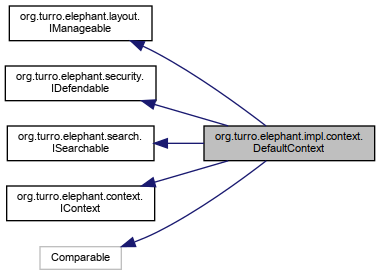
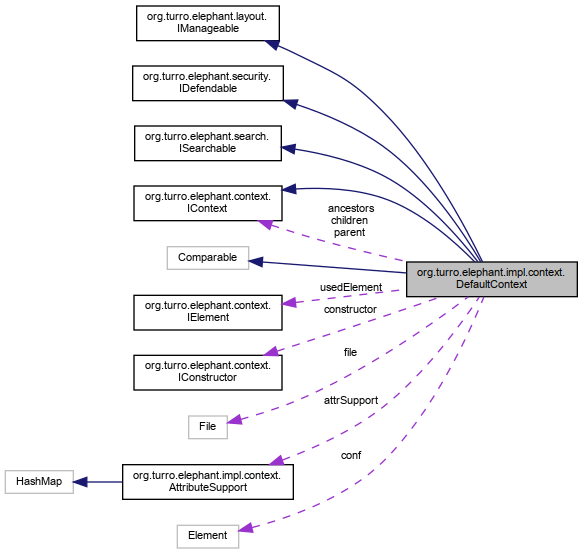
Public Member Functions | |
| DefaultContext () | |
| boolean | equals (Object obj) |
| int | hashCode () |
| String | getId () |
| String | getType () |
| IContext | getContext () |
| String | getName () |
| String | getName (String lang) |
| String | getExactName (String lang) |
| void | setName (String lang, String newName) |
| String | getTitle () |
| String | getIcon () |
| void | setIcon (String icon) |
| String | getRedirection () |
| String | getTarget () |
| IElement | getDefaultElement () |
| IElement | getDefaultElement (String type) |
| Set< String > | getDefaultLocales () |
| void | setConstructor (IConstructor constructor, String path) |
| String | getFullPath () |
| String | getWebPath () |
| String | getPath () |
| int | getLevel () |
| File | getFile () |
| void | startConstruction () throws ServletException, IOException |
| IContext | getParent () |
| IContext[] | getAncestors () |
| IContext[] | getChildren () |
| IContext[] | getSiblings () |
| String[] | getBaseNames () |
| String[] | getLocaleResources (String preferredLocale) |
| IConstructor | getConstructor () |
| String | getTypeName () |
| AttributeSupport | getAttributes () |
| void | applyChanges () |
| void | populateFromParent () |
| String[] | getLocaleSufixes (String preferredLocale) |
| Repository | getRepository () |
| boolean | inPath (IContext context) |
| int | compareTo (Object o) |
| boolean | canDisplay () |
| boolean | isSelectable () |
| boolean | isInRole () |
| boolean | canPrint () |
| FoundList | search (String value, boolean ignoreCase) |
Static Public Member Functions | |
| static String | locateRealContext (IConstructor constructor, String path) |
| static String | extractPath (String path) |
Static Public Attributes | |
| static final String | CONTEXT_FILE = "/_internal/context.xml" |
Protected Attributes | |
| IConstructor | constructor |
| String | path |
| File | file |
| IElement | usedElement = null |
| Element | conf |
| IContext[] | children |
| IContext | parent |
| String[] | defaultLocales |
| AttributeSupport | attrSupport |
Definition at line 60 of file DefaultContext.java.
| org.turro.elephant.impl.context.DefaultContext.DefaultContext | ( | ) |
Creates a new instance of DefaultContext
Definition at line 77 of file DefaultContext.java.

| void org.turro.elephant.impl.context.DefaultContext.applyChanges | ( | ) |
Implements org.turro.elephant.layout.IManageable.
Definition at line 606 of file DefaultContext.java.

| boolean org.turro.elephant.impl.context.DefaultContext.canDisplay | ( | ) |
This method is queried within startConstruction().
Implements org.turro.elephant.security.IDefendable.
Definition at line 763 of file DefaultContext.java.
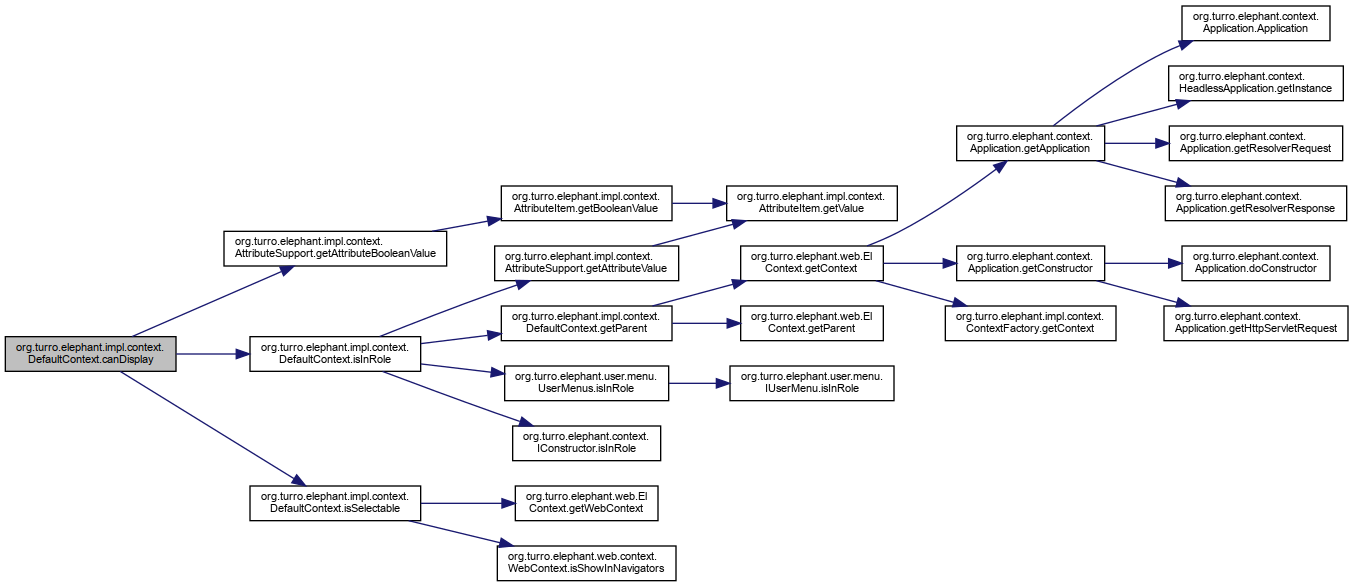
| boolean org.turro.elephant.impl.context.DefaultContext.canPrint | ( | ) |
This method is queried when a print version is being called.
Implements org.turro.elephant.security.IDefendable.
Definition at line 784 of file DefaultContext.java.
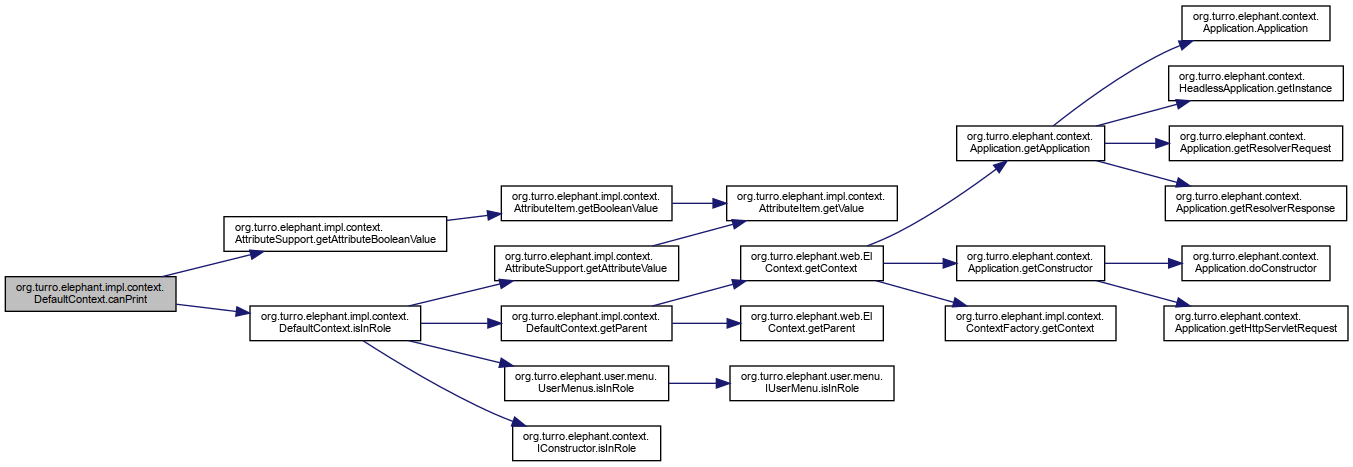

| int org.turro.elephant.impl.context.DefaultContext.compareTo | ( | Object | o | ) |
Definition at line 744 of file DefaultContext.java.

| boolean org.turro.elephant.impl.context.DefaultContext.equals | ( | Object | obj | ) |
Definition at line 82 of file DefaultContext.java.


|
static |
| IContext [] org.turro.elephant.impl.context.DefaultContext.getAncestors | ( | ) |
The returning array for this method has as the first element, the root context, and the last, the calling context.
Implements org.turro.elephant.context.IContext.
Definition at line 454 of file DefaultContext.java.

| AttributeSupport org.turro.elephant.impl.context.DefaultContext.getAttributes | ( | ) |
Implements org.turro.elephant.layout.IManageable.
Definition at line 601 of file DefaultContext.java.
| String [] org.turro.elephant.impl.context.DefaultContext.getBaseNames | ( | ) |
Definition at line 536 of file DefaultContext.java.


| IContext [] org.turro.elephant.impl.context.DefaultContext.getChildren | ( | ) |
Implements org.turro.elephant.context.IContext.
Definition at line 474 of file DefaultContext.java.

| IConstructor org.turro.elephant.impl.context.DefaultContext.getConstructor | ( | ) |
Implements org.turro.elephant.context.IContext.
Definition at line 591 of file DefaultContext.java.
| IContext org.turro.elephant.impl.context.DefaultContext.getContext | ( | ) |
Allows mixing IElement and IContext and get a reference to context.
Implements org.turro.elephant.context.IContext.
Definition at line 107 of file DefaultContext.java.

| IElement org.turro.elephant.impl.context.DefaultContext.getDefaultElement | ( | ) |
Implements org.turro.elephant.context.IContext.
Definition at line 222 of file DefaultContext.java.


| IElement org.turro.elephant.impl.context.DefaultContext.getDefaultElement | ( | String | type | ) |
| type | Element's type. |
Implements org.turro.elephant.context.IContext.
Definition at line 234 of file DefaultContext.java.
| Set<String> org.turro.elephant.impl.context.DefaultContext.getDefaultLocales | ( | ) |
Implements org.turro.elephant.context.IContext.
Definition at line 261 of file DefaultContext.java.


| String org.turro.elephant.impl.context.DefaultContext.getExactName | ( | String | lang | ) |
Implements org.turro.elephant.context.IContext.
Definition at line 149 of file DefaultContext.java.

| File org.turro.elephant.impl.context.DefaultContext.getFile | ( | ) |
Implements org.turro.elephant.context.IContext.
Definition at line 383 of file DefaultContext.java.
| String org.turro.elephant.impl.context.DefaultContext.getFullPath | ( | ) |
Full path intention is to provide an easy way for creating absolute links, starting with a slash.
Implements org.turro.elephant.context.IContext.
Definition at line 352 of file DefaultContext.java.


| String org.turro.elephant.impl.context.DefaultContext.getIcon | ( | ) |
Returns the image representing this context.
Implements org.turro.elephant.context.IContext.
Definition at line 201 of file DefaultContext.java.

| String org.turro.elephant.impl.context.DefaultContext.getId | ( | ) |
Identifier is a unique value within Elephant web application.
Implements org.turro.elephant.context.IContext.
Definition at line 97 of file DefaultContext.java.

| int org.turro.elephant.impl.context.DefaultContext.getLevel | ( | ) |
Implements org.turro.elephant.context.IContext.
Definition at line 378 of file DefaultContext.java.
| String [] org.turro.elephant.impl.context.DefaultContext.getLocaleResources | ( | String | preferredLocale | ) |
Definition at line 552 of file DefaultContext.java.

| String [] org.turro.elephant.impl.context.DefaultContext.getLocaleSufixes | ( | String | preferredLocale | ) |
Locale sufixes is a combination of locales in a single request. It's composed by user selection (the cookie 'lang'), navigator preferences and context preferences. Default context's language, first place in getDefaultLocales(), is included as an empty string.
| preferredLocale | Locale that will take first place. |
Implements org.turro.elephant.context.IContext.
Definition at line 644 of file DefaultContext.java.


| String org.turro.elephant.impl.context.DefaultContext.getName | ( | ) |
Context name is the text that shows in navigators. This method returns the same value than calling getName(null).
Implements org.turro.elephant.context.IContext.
Definition at line 112 of file DefaultContext.java.

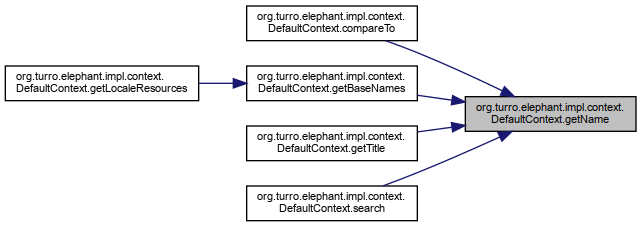
| String org.turro.elephant.impl.context.DefaultContext.getName | ( | String | lang | ) |
Context name is the text that shows in navigators.
| lang | Specific locale |
lang locale. Implements org.turro.elephant.context.IContext.
Definition at line 122 of file DefaultContext.java.
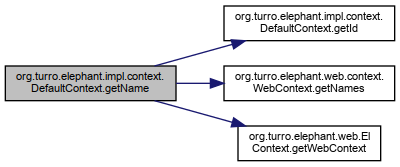
| IContext org.turro.elephant.impl.context.DefaultContext.getParent | ( | ) |
Implements org.turro.elephant.context.IContext.
Definition at line 440 of file DefaultContext.java.
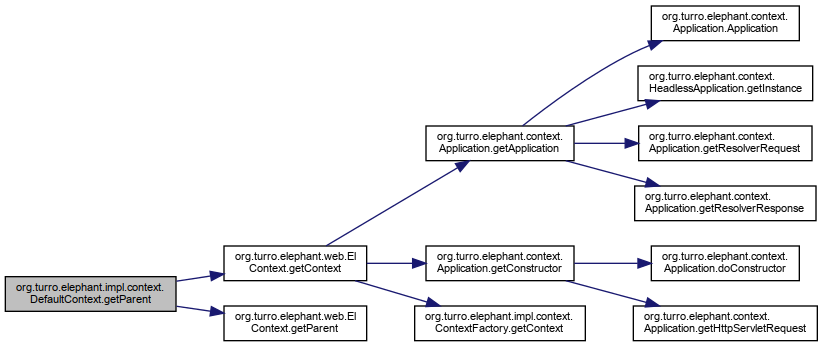

| String org.turro.elephant.impl.context.DefaultContext.getPath | ( | ) |
Implements org.turro.elephant.context.IContext.
Definition at line 373 of file DefaultContext.java.

| String org.turro.elephant.impl.context.DefaultContext.getRedirection | ( | ) |
When a context has a redirection it never gets selected, instead browser receives a redirection response.
Implements org.turro.elephant.context.IContext.
Definition at line 210 of file DefaultContext.java.


| Repository org.turro.elephant.impl.context.DefaultContext.getRepository | ( | ) |
Definition at line 701 of file DefaultContext.java.
| IContext [] org.turro.elephant.impl.context.DefaultContext.getSiblings | ( | ) |
Implements org.turro.elephant.context.IContext.
Definition at line 499 of file DefaultContext.java.

| String org.turro.elephant.impl.context.DefaultContext.getTarget | ( | ) |
Implements org.turro.elephant.context.IContext.
Definition at line 216 of file DefaultContext.java.

| String org.turro.elephant.impl.context.DefaultContext.getTitle | ( | ) |
Context title defaults to context name. Elements can override this value.
Implements org.turro.elephant.context.IContext.
Definition at line 192 of file DefaultContext.java.

| String org.turro.elephant.impl.context.DefaultContext.getType | ( | ) |
Implements org.turro.elephant.context.IContext.
Definition at line 102 of file DefaultContext.java.

| String org.turro.elephant.impl.context.DefaultContext.getTypeName | ( | ) |
Implements org.turro.elephant.layout.IManageable.
Definition at line 596 of file DefaultContext.java.

| String org.turro.elephant.impl.context.DefaultContext.getWebPath | ( | ) |
Works as getFullPath method but takes into account redirections
Implements org.turro.elephant.context.IContext.
Definition at line 359 of file DefaultContext.java.

| int org.turro.elephant.impl.context.DefaultContext.hashCode | ( | ) |
Definition at line 90 of file DefaultContext.java.
| boolean org.turro.elephant.impl.context.DefaultContext.inPath | ( | IContext | context | ) |
This method is used by navigators in order to check whether a context exists in currently selected context. Therefore a call like context.inPath(current) must return true if context is one of current ancestors.
| context | A context to check its path with. |
Implements org.turro.elephant.context.IContext.
Definition at line 737 of file DefaultContext.java.

| boolean org.turro.elephant.impl.context.DefaultContext.isInRole | ( | ) |
This method points to an specific role, know at configuration time. To achieve more control on roles use constructor's, which takes a parameter with a role.
Implements org.turro.elephant.security.IDefendable.
Definition at line 774 of file DefaultContext.java.
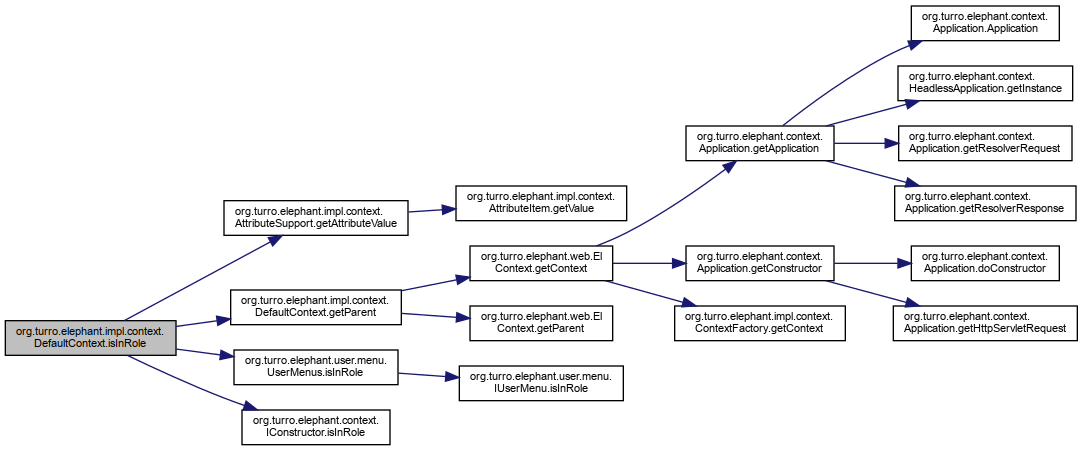

| boolean org.turro.elephant.impl.context.DefaultContext.isSelectable | ( | ) |
Selectable elements may respond to user input.
Implements org.turro.elephant.security.IDefendable.
Definition at line 769 of file DefaultContext.java.


|
static |
Definition at line 812 of file DefaultContext.java.


| void org.turro.elephant.impl.context.DefaultContext.populateFromParent | ( | ) |
Implements org.turro.elephant.layout.IManageable.
Definition at line 630 of file DefaultContext.java.
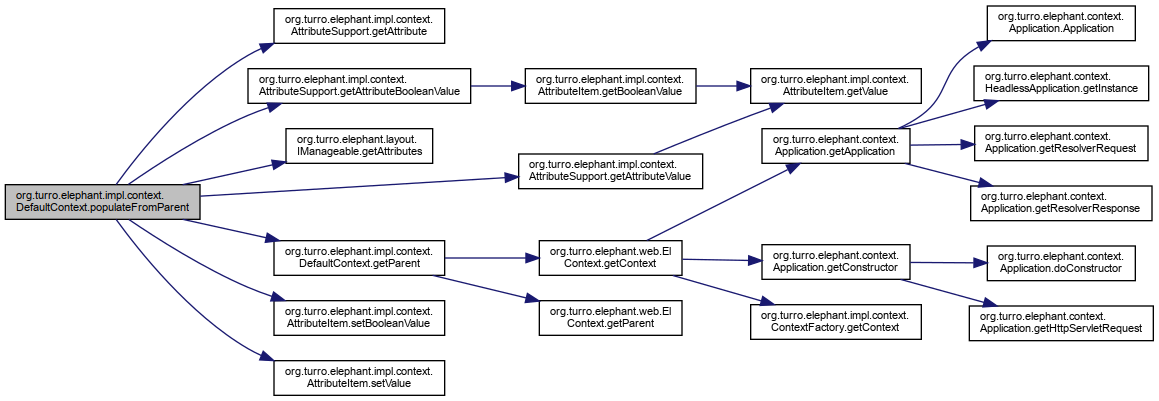
| FoundList org.turro.elephant.impl.context.DefaultContext.search | ( | String | value, |
| boolean | ignoreCase | ||
| ) |
This method is called by Elephant search implementation.
| value | Value to search. |
| ignoreCase | Whether to ignore case. |
Implements org.turro.elephant.search.ISearchable.
Definition at line 790 of file DefaultContext.java.
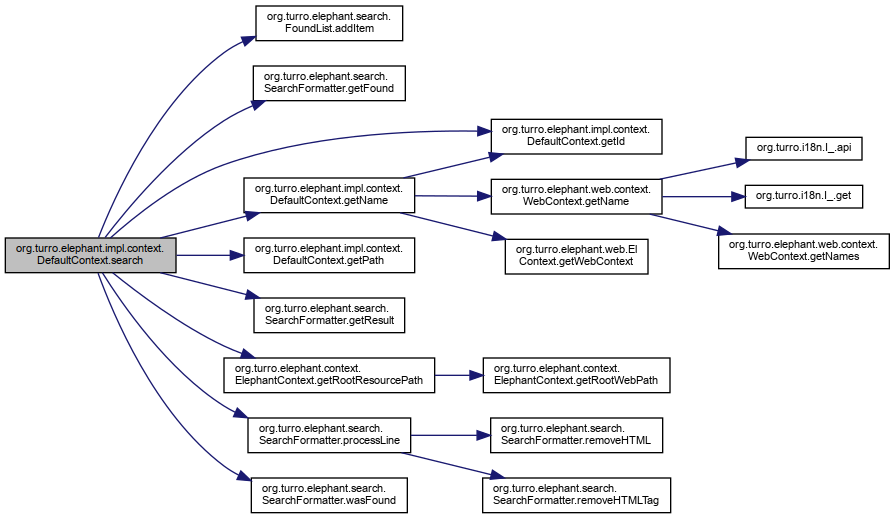
| void org.turro.elephant.impl.context.DefaultContext.setConstructor | ( | IConstructor | constructor, |
| String | path | ||
| ) |
This method gets authomatically called from ContextFactory. Its intention is to set constructor and context path.
| constructor | Constructor that generated context creation. |
| path | Context's relative path, starting with a slash or empty for root context. |
Implements org.turro.elephant.context.IContext.
Definition at line 280 of file DefaultContext.java.
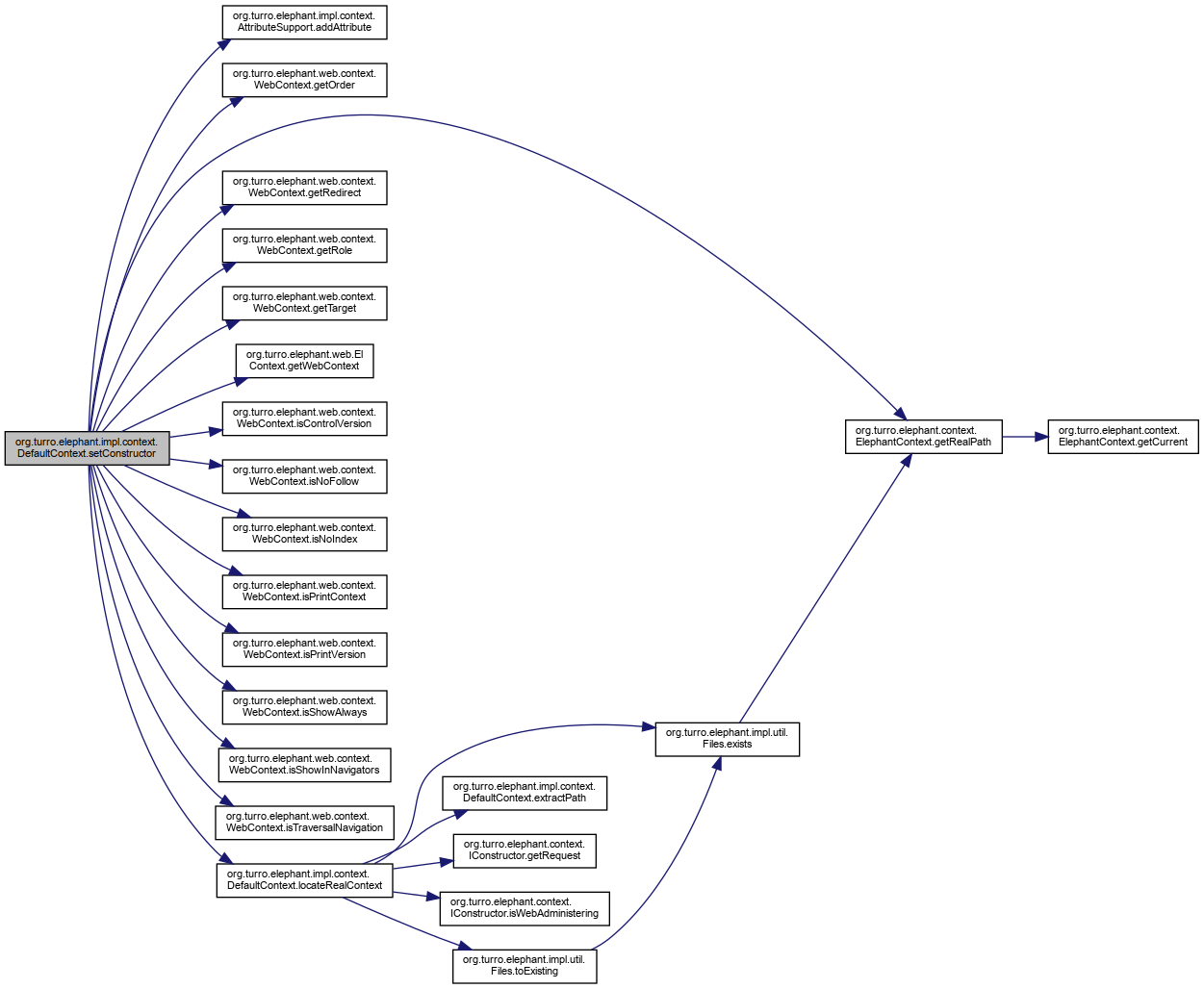
| void org.turro.elephant.impl.context.DefaultContext.setIcon | ( | String | icon | ) |
Sets the image that represents this context.
| icon | URL to icon. |
Implements org.turro.elephant.context.IContext.
Definition at line 206 of file DefaultContext.java.
| void org.turro.elephant.impl.context.DefaultContext.setName | ( | String | lang, |
| String | name | ||
| ) |
Sets context's name in the given locale.
| lang | Specific locale. |
| name | Context name. |
Implements org.turro.elephant.context.IContext.
Definition at line 167 of file DefaultContext.java.

| void org.turro.elephant.impl.context.DefaultContext.startConstruction | ( | ) | throws ServletException, IOException |
Start construction should be aware of which layout is being used, in order to give an initialization code. This is done automatically by ILayoutManager, returned by ContextFactory.
| javax.servlet.ServletException | |
| java.io.IOException |
Implements org.turro.elephant.context.IContext.
Definition at line 407 of file DefaultContext.java.
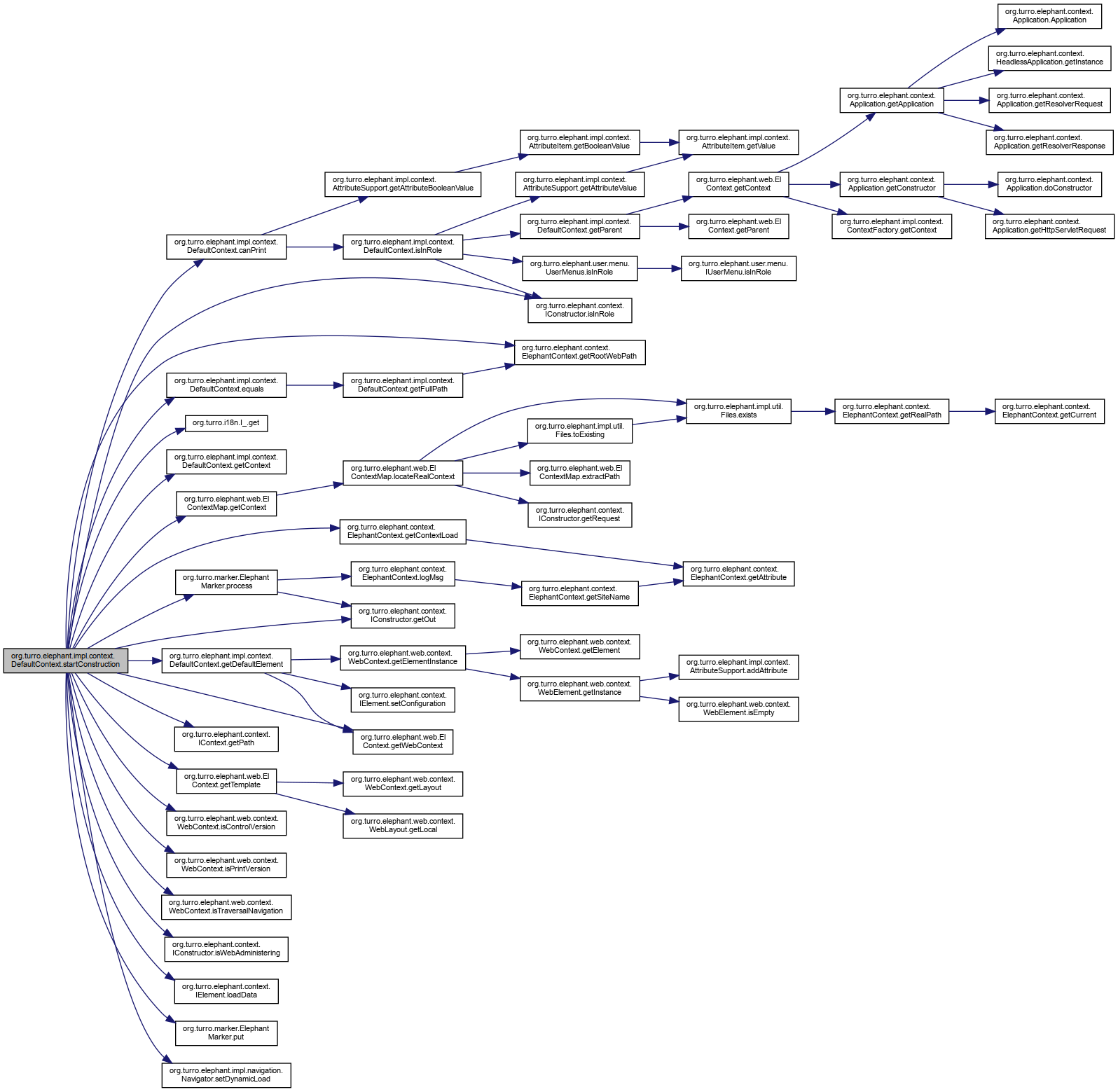
|
protected |
Definition at line 74 of file DefaultContext.java.
|
protected |
Definition at line 71 of file DefaultContext.java.
|
protected |
Definition at line 69 of file DefaultContext.java.
|
protected |
Definition at line 65 of file DefaultContext.java.
|
static |
Definition at line 64 of file DefaultContext.java.
|
protected |
Definition at line 73 of file DefaultContext.java.
|
protected |
Definition at line 67 of file DefaultContext.java.
|
protected |
Definition at line 72 of file DefaultContext.java.
|
protected |
Definition at line 66 of file DefaultContext.java.
|
protected |
Definition at line 68 of file DefaultContext.java.